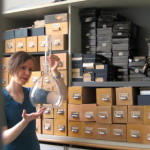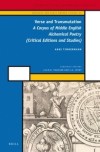Featured Author: Anke Timmermann

Anke Timmermann speaks about her book, Verse and Transmutation: A Corpus of Middle English Alchemical Poetry, published by Brill.
Why did you agree to allow your book to be included in the Knowledge Unlatched Pilot?
I have investigated different ways to communicate my research since I first started working on the history of alchemy 13 years ago. My outreach activities to date include exhibitions, blogs and podcasts, but a scholarly monograph requires a different approach.
I chose my publisher (Brill) because of their expertise in publishing history of science materials as well as editions of historical texts, in scholarly solid and physically attractive volumes; but due to their careful, and hence costly, production these do not always reach readers who would like to consult, but not to buy a copy. Free to me as author and to potential audiences, Knowledge Unlatched hence provides the perfect forum for me to communicate my research to a wider audience.
What are your hopes for your book, and do you think Open Access will play a role in achieving them?
My book consists of two parts. Firstly, it provides editions of previously unedited Middle English texts which, while describing alchemical recipes, will be generally of interest to medievalists and manuscript scholars. These are texts from the period of Chaucer through Shakespeare, recipes that are recorded in manuscripts with recipes e.g. for dyes and medicines, related to cookery and metalworking, written in English and Latin, illustrated and translated, and generally very diverse in their form and presentation. Therefore, anyone interested in late medieval England, literature, science and craft practices may want to consult my editions. The editions also lend themselves to teaching anything from historical varieties of English to the history of science. Here Open Access will help me use my work in the way I intended: to make sources available, akin to a digital text collection.
Secondly, the chapters I wrote on the history of the edited alchemical texts are self-contained studies which can be read in isolation from each other and the editions themselves. They feature well-known historical personalities like John Dee, institutions like Trinity College Cambridge, new information on well-known manuscripts and new discoveries. I am very happy that readers will now be able to retrieve these case studies as easily as articles in Open Access journals, to use, cite and build upon my results in their own publications.
In short, my work will be both more visible and more useful to others: this format allows me to share my research in ways that the printed volume alone could not achieve.
Knowledge Unlatched ... provides the perfect forum for me to communicate my research to a wider audience.
What do your friends/colleagues think about your decision to allow your book to be made available for free under a CC licence?
The range of reactions is as varied as the nationalities and personalities of my professional contacts. Some appear sceptical; many applaud the initiative and my decision to take part in it; and quite a few are investigating possibilities to publish their forthcoming publications in a similar format. As a historian I cannot help but notice that the shift to Open Access for monographs meets reactions similar to those that have accompanied new media and technologies for many centuries. But thanks to the fact that Knowledge Unlatched does not place a financial burden on authors some objections commonly voiced for other models do not seem to arise.
Do you think that making your book available on an Open Access licence will increase its reach and impact?
I certainly hope so.
Who would you most like to read your book and why?
Anyone interested in the history of scientific texts, communication and alchemy, or in corpus studies, will be a natural reader of this volume. But my envisaged audience is much wider than that: I should like to engage students of related subjects (history of science, English, archival studies, etc.) as well as established researchers in manuscript studies and the history of the book, intellectual historians and linguists, and indeed a general educated public who, just by reading individual parts (even the introduction), may revise their assumptions about what alchemy and the Middle Ages are all about. A tall order, certainly. But the Open Access format will invite browsers who would also pick up the book in a bookshop.
How do you think your dream reader might find your book?
Scholars will find it through structured searches for literature relating to the history of alchemy, Middle English writing and corpus-based research, through library catalogues and database searches; general audiences may be directed towards it through browser searches for information on alchemy, any of the historical characters mentioned in my book or other pertinent keywords.
Knowledge Unlatched does not place a financial burden on authors.
Were you interested in Open Access before you became aware of the Knowledge Unlatched pilot?
I was indeed: as a scholar reading others’ works, as an author, and as someone with a background in librarianship and the digital humanities. Since I had followed the emergence of different models and the academic and public reaction to them I was very happy to discover Knowledge Unlatched.
Any other comments?
I would like to thank the institutions that provided images for my book for their generous permissions, which allow me to include the same images in the Open Access version; my editor at Brill, Michiel Thijssen, for suggesting the inclusion of Verse and Transmutation in the Knowledge Unlatched Pilot; and Knowledge Unlatched for accepting his suggestion. It has been wonderful working with individuals who are as invested in the communication of ideas as I am.
Anke Timmermann's Verse and Transmutation: A Corpus of Middle English Alchemical Poetry as well as 27 other titles are available through our Pilot Collection.

